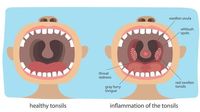The Robert Koch Institute (RKI) has issued a warning regarding a potential nationwide outbreak of diphtheria in Germany, highlighting the need for increased public awareness of this dangerous infectious disease. The disease, caused by the bacterium Corynebacterium diphtheriae, can lead to severe respiratory complications and even death if not treated promptly.
According to the RKI's latest "Epidemiological Bulletin" (18/2025), current genome sequencing analyses indicate a significant rise in diphtheria cases, particularly those involving the sequence type ST574, which was first detected in Germany in the fall of 2022 during a Europe-wide outbreak. By the end of April 2025, a total of 126 cases linked to this strain had been reported nationwide, with four new cases identified this year alone.
The majority of the cases have predominantly affected vulnerable populations, including refugees, homeless individuals, drug users, unvaccinated people, and older adults with pre-existing health conditions. The RKI has noted that infections are increasingly occurring within Germany, a concerning trend that suggests a shift in the disease's transmission dynamics.
"The current situation indicates that diphtheria is not just limited to refugee populations anymore, but is affecting a broader spectrum of society," stated the RKI in its report. This shift raises alarms as the disease was once thought to be under control due to widespread vaccination efforts.
Historically, diphtheria was a leading cause of childhood mortality, famously known as the "angel of death for children." In 1892, more than 50,000 young people succumbed to the disease in Germany alone. However, the introduction of the diphtheria vaccine in 1913 dramatically reduced infection rates, rendering the disease almost extinct in the following decades.
Despite these advancements, the RKI warns that recent trends show an alarming increase in respiratory diphtheria cases, which can lead to severe complications such as shortness of breath, heart damage, and nerve issues due to the toxins produced by the bacteria. Symptoms typically begin with fever, fatigue, sore throat, and swallowing difficulties, which can escalate rapidly.
As of 2024, the RKI recorded 51 confirmed diphtheria cases, with two reported in 2025 so far. The institute emphasizes that the rise in cases among vulnerable groups, particularly those who are unvaccinated or have limited access to healthcare, highlights a pressing public health concern. The RKI has called for heightened vigilance among medical professionals and health authorities to identify and manage potential cases effectively.
In light of these developments, the RKI strongly recommends vaccination against diphtheria, especially for at-risk populations. Vaccination is the most effective means of preventing the disease and its associated complications. The standard vaccination schedule includes three doses starting at two months of age, followed by boosters every five to ten years for adults.
"Vaccinations prevent diseases that many today are unaware of due to their rarity," noted Reinhard Berner, chairman of the Standing Committee on Vaccination (Stiko). He emphasized the importance of maintaining high vaccination rates to protect against diseases like diphtheria, which, despite being largely forgotten, still poses a significant risk.
Current vaccination rates indicate a troubling trend, with only 64 percent of children aged 15 months fully immunized against diphtheria. This decline in vaccination uptake could contribute to the resurgence of the disease, as the RKI has observed an increase in severe cases, particularly respiratory diphtheria, which can be fatal.
The RKI has outlined specific recommendations for healthcare providers in light of the outbreak. Medical personnel are urged to conduct thorough testing for diphtheria in suspected cases, particularly in vulnerable populations. Laboratories are advised to implement PCR diagnostics for the diphtheria toxin gene and report any positive cases promptly.
Furthermore, the RKI has identified two genetically related sub-clusters of diphtheria cases: one primarily affecting the Frankfurt am Main area and another in Berlin and other federal states. There are also indications of genetic similarities with cases in neighboring countries, suggesting a potential cross-border spread of the outbreak.
As the situation evolves, the RKI continues to monitor the outbreak closely and is advocating for increased awareness and preventive measures among the general public. The organization stresses that anyone experiencing symptoms such as a sore throat, cough, or fever should consider the possibility of diphtheria and seek medical attention promptly.
The resurgence of diphtheria serves as a stark reminder of the importance of vaccination and public health vigilance. As the RKI continues to track the outbreak, it remains crucial for individuals to stay informed and ensure their vaccinations are up to date, particularly in light of the changing epidemiological landscape.
In summary, the RKI's findings underscore the urgent need for heightened awareness and preventive action against diphtheria, particularly among vulnerable populations. The potential for a widespread outbreak necessitates a collective response to safeguard public health and prevent the resurgence of this once-dominant infectious disease.






